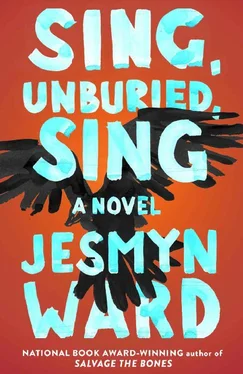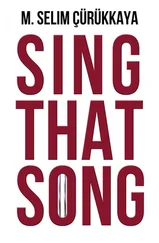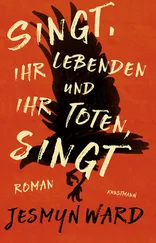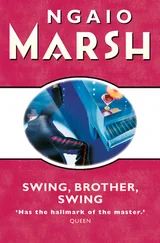“Was a gunman named Blue that did it. It was a baseball Sunday; there was visitors. Some good-time girls, some men’s wives came. But Blue ain’t never had nobody. Called him Blue because he was so dark he shined like a plum in the sun, on the line. But he wasn’t right in the head; that’s why none of the women would talk to him. Wouldn’t take no visits with him. So he caught one of the women inmates out by the outhouses, and dragged her off into a stand.” Pop stops, looks back at the house.
“What he do?” I say.
“He raped her,” Pop says. “She was a strong woman, hands near as callused as his from all the picking and sewing she did, but she wasn’t no match for him. Hit anybody in the head hard enough, it knock them out. Her face—you could barely recognize her. And maybe nothing would have happened to Blue for doing it if she hadn’t been the sergeant’s wife’s favorite. Always the one she called to hang wash and scrub floors or mind the kids. Blue had enough brains to know that. So he left her there, striped skirt up around her head, covering her bloody face, that fabric turning muddy and red. Left her breathing bubbles. To run. But before he could get away good, he found Richie. I don’t know where. Whether Richie was around the kitchens or the bathrooms or taking tools from one place to the next, but when Blue lit out, Richie was with him.”
“I found them,” Richie says. “He was climbing up off her. Big bloody hands. Was one of the strongest gunmen; he could outpick most everybody. He say to me: You want a face like hers, boy? I told him no. And he waved one of them big hands and said: Come . Part of me went because I didn’t want him to turn my face red like hers. And part of me went because I was sick of that place. Because I wanted to go.”
The woods around us are a great dark green tangle: oaks reaching low and wide, vines tangled around trunks and drooping from branches, poison sumac and swamp tupelo and cypress and magnolia growing up around us in a circular wall.
“You went after them?” I ask.
Richie’s leaning toward Pop so far that if he was alive, he’d have fell. His jaw works from side to side, his teeth grinding against each other.
“Yes.” Pop squeezes the hammer so hard his knuckles whiten, and then he lets his hands loose. He squeezes again, lets his hands loosen.
“Yes,” Richie says. “Yes.”
A crane cuts the air, gray and pink-kneed, overhead. It doesn’t squawk or call. It says nothing.
“What happen?”
Pop measures me again. I push my shoulders back, make sure my chin stays hard.
“Jojo?”
I nod.
“A man like Blue? Is a man like Hogjaw.”
Hogjaw: the big, brutal White man who worked with Pop and the dogs. Pop swings and another corner of the pen collapses.
“Got no regard for life. Any life.”
Richie opens and closes his mouth. Works his tongue between his teeth. It is as if he is eating air.
“I had to track them.”
Swallowing Pop’s words.
“Less mind was paid to the women on Sundays. Was five hours before anybody found her, realized Blue and Richie was missing, before the sergeant put it all together,” Pop says. “That’s enough time to run them fifteen miles to the edge of Parchman. To get back to the free world. The warden yelling at everybody, his clothes wet as if he’d went swimming in them. A White woman next! he said.”
“It was enough time,” Richie says. His voice grating and hollow as a frog’s croak. Starved for rain. “He ran so fast. Sometimes I had to follow him by sound. From one clearing to the next. Crawl under bushes and vines. Him busting through the woods, but talking to hisself the whole time. Not hisself. His mama. Telling her he was coming home. That he wanted her to sing for him. Sing for your son , he said. Sing. ”
The hammer whistles through the air. The termites writhe in their ruined home.
“I wasn’t fast enough. He came up on a girl fetching water from a spring. Knocked her down,” Pop says. “Ripped her dress clean down the front. She ran home, holding it like that. Little White girl with red hair. Told her daddy some crazy nigger attacked her.”
“I stopped him,” Richie says. “Hit him with a tree limb. Hard enough to get him off her. Hard enough to get me punched in the face.”
“Word was out by then. Richie and Blue had run long and far enough for the sun to set, and White folks was gathering. All the menfolk. Little boys younger than Richie in overalls hanging by one strap on the backs of pickups. What seemed like a thousand of them. Look like their faces had a red mist on them in the truck lights, but everything else about them look black in the dark: clothes, hair, eyes. I could see it on them: the way every damn one of them seemed to lean forward, eager as hounds to the hunt. And the laughing. They couldn’t stop. And I knew that when it came to the two of them, when it came to Blue and Richie, they wasn’t going to tell no difference. They was going to see two niggers, two beasts, who had touched a White woman.”
Richie has never been so still, so silent. His mouth frozen open. His eyes wide and black. He is balanced on his toes, and he could be made of stone. But every part of Pop moves: his hands as he speaks; his shoulders folding forward as softly as a flower wilting at the hottest part of the day. I’ve never seen them do that. His face, all the lines of his face, sliding against each other like the fault lines of the great fractured earth. What undergirds it: pain. The sledgehammer fallen.
“I ran them dogs past the fence, past the edge of Parchman, out into the Delta. Through the flat plain, the earth turned to scrub and balded from them black hands. All them black hands. The dirt black as them hands and crumbly. The way it gives under the foot, leaves clear tracks. I followed their tracks, and the dogs followed the smell, through the bristly stands of trees, over them deceitful fields, past the spring and the shacks to more fields, more shacks with White men and boys gathering and swarming. Moving like one thing. To kill.”
Pop ducks his head, wipes his sweat on his shoulder. He stomps his foot and it is like a horse’s, warning before it kicks.
“What happen?” I prod.
Pop doesn’t look up.
“Warden and sergeants was in cars on the road, following the dogs. Their baying. All them men roaming, had they dogs out too, and it was a boy who stumble across Blue. He was up a tree in one of them stands to the west. I had to squint at the shouts that came up when they found him. They started firing off they rifles, and the warden and sergeants and trusty shooters rode that way. I heeled my dogs. Waited. Because they wasn’t pointed west. They was pointed north, and I knew it was Richie they followed. Wasn’t five minutes passed before I saw the bonfire they lit, and I knew what was happening. I knew before I even heard Blue start screaming.”
Richie blinks. His fingers splayed like bird’s wings. His blinks start slow, but as Pop talks, they get faster until they’re blurred like a hummingbird, and all I see are his eyes, his black eyes, with a thin scrim over them.
“One of the trusties told me later they was cutting pieces of him off. Fingers. Toes. Ears. Nose. And then they started skinning him. That’s when I followed the dogs, making them quiet, across that sky turning from blue to black, across them fields, to another stand of trees. And Richie hunched down at the base of one, cupping his black eye. Crying. Nose up, listening to Blue and the crowd.”
Richie makes fists, lets them go. Makes fists. Spreads his fingers to wings.
“They was going to do the same to him. Once they got done with Blue. They was going to come for that boy and cut him piece from piece till he was just some bloody, soft screaming thing, and then they was going to string him up from a tree.”
Читать дальше












